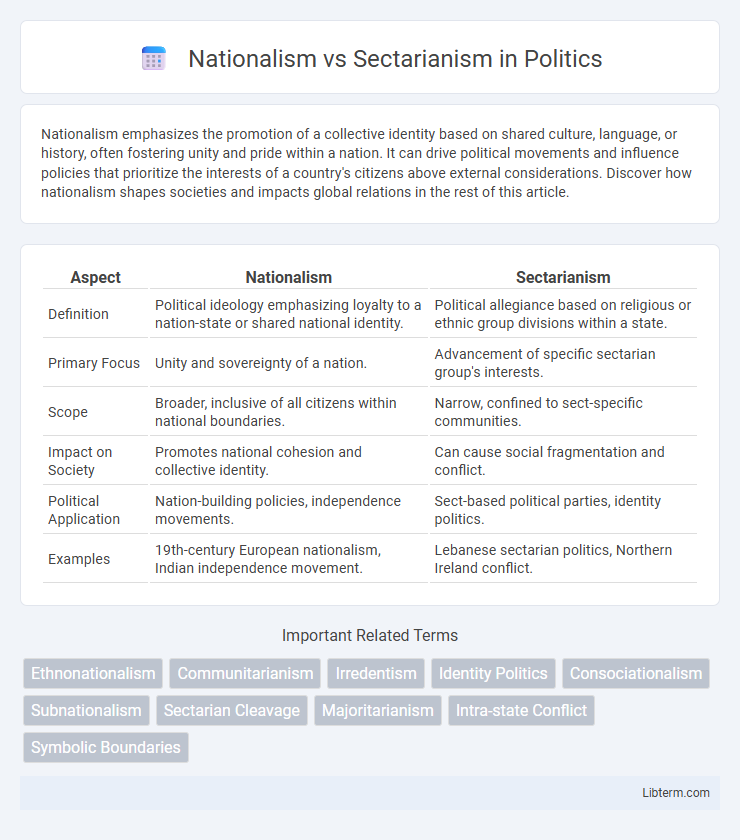Nationalism emphasizes the promotion of a collective identity based on shared culture, language, or history, often fostering unity and pride within a nation. It can drive political movements and influence policies that prioritize the interests of a country's citizens above external considerations. Discover how nationalism shapes societies and impacts global relations in the rest of this article.
Table of Comparison
| Aspect | Nationalism | Sectarianism |
|---|---|---|
| Definition | Political ideology emphasizing loyalty to a nation-state or shared national identity. | Political allegiance based on religious or ethnic group divisions within a state. |
| Primary Focus | Unity and sovereignty of a nation. | Advancement of specific sectarian group's interests. |
| Scope | Broader, inclusive of all citizens within national boundaries. | Narrow, confined to sect-specific communities. |
| Impact on Society | Promotes national cohesion and collective identity. | Can cause social fragmentation and conflict. |
| Political Application | Nation-building policies, independence movements. | Sect-based political parties, identity politics. |
| Examples | 19th-century European nationalism, Indian independence movement. | Lebanese sectarian politics, Northern Ireland conflict. |
Understanding Nationalism: Core Concepts
Nationalism centers on the shared identity, culture, and political aspirations of a nation, emphasizing unity and sovereignty within defined territorial boundaries. Core concepts include self-determination, collective pride, and the pursuit of national independence or autonomy. Understanding nationalism involves recognizing its role in political movements, state formation, and as a source of social cohesion or conflict.
Defining Sectarianism: What Sets it Apart
Sectarianism is defined by allegiance to a specific religious, ethnic, or cultural group, often leading to exclusion or discrimination against others outside the group, contrasting with nationalism's focus on shared identity within a political state. It involves deep-rooted divisions and competition between sects that undermine social cohesion and fuel conflict. Unlike nationalism's broader unifying goals, sectarianism emphasizes sect-based loyalty, which can fracture societies and obstruct nation-building efforts.
Historical Roots of Nationalism and Sectarianism
Nationalism originated in the 18th and 19th centuries as a political ideology emphasizing collective identity based on shared language, culture, and history, often tied to the formation of modern nation-states. Sectarianism has deeper historical roots, frequently linked to religious, ethnic, or ideological divisions within societies, often predating modern nationalism by centuries. Understanding these distinct origins is crucial for analyzing contemporary conflicts where nationalist aspirations intersect with sectarian loyalties.
Nationalism: Unifying Force or Divisive Ideology?
Nationalism serves as a powerful unifying force by fostering a collective identity based on shared culture, history, and values, which strengthens social cohesion and national pride. However, it can also become a divisive ideology when it promotes exclusionary practices or prioritizes a dominant group's interests over minority rights, leading to social fragmentation. The balance between inclusive nationalism and sectarian exclusion remains critical for maintaining national unity in diverse societies.
Sectarianism: Social Fragmentation and Identity Politics
Sectarianism drives social fragmentation by dividing communities along ethnic, religious, or ideological lines, undermining national unity. Identity politics fueled by sectarianism often leads to exclusionary practices and heightened intergroup tensions, impacting social cohesion and political stability. Addressing sectarian divides requires inclusive governance and policies that promote cross-sectional dialogue and equitable representation.
Case Studies: Nationalism in Modern Nation-States
Nationalism in modern nation-states emphasizes unifying diverse populations around shared identity, culture, and political sovereignty, as seen in Germany's 19th-century unification under Prussian leadership. The Indian independence movement illustrates nationalism's role in mobilizing mass support against colonial rule by promoting a collective national identity transcending regional and religious divisions. Comparative case studies reveal nationalism's potential to foster state cohesion, contrasting with sectarianism, which fragments societies through exclusive loyalty to ethnic or religious groups.
Sectarianism in Practice: Global Examples and Consequences
Sectarianism in practice manifests through deep-rooted divisions often based on religion, ethnicity, or ideology, leading to conflicts like the Sunni-Shia tensions in the Middle East and the religious strife in Northern Ireland. These divisions result in social fragmentation, political instability, and violence, undermining national unity and economic development. Global examples reveal that sectarianism fosters exclusion, discrimination, and cycles of retaliation, severely impacting peacebuilding efforts and regional security.
Cultural and Religious Dimensions: Intersection or Divergence?
Nationalism often emphasizes a shared cultural heritage, language, and collective identity that transcends religious affiliations, while sectarianism prioritizes religious divisions, fostering loyalty within specific faith communities. The cultural dimension of nationalism seeks unity through common traditions and historical narratives, contrasting with sectarianism's focus on religious doctrines and practices that can deepen societal fractures. This divergence highlights the complex interplay where nationalism can either bridge or exacerbate sectarian divides depending on whether inclusivity or exclusivity defines the nationalist agenda.
Political Impacts: Stability, Conflict, and Governance
Nationalism often strengthens state stability by promoting a unified political identity and centralized governance, reducing internal divisions across ethnic or religious lines. In contrast, sectarianism tends to fragment political structures, inciting conflicts and undermining governance through factionalism and competing loyalties. The political impact of nationalism versus sectarianism is evident in regions where nationalistic policies foster institutional cohesion, while sectarianism exacerbates instability and challenges effective state administration.
Navigating the Future: Towards Inclusive Societies
Nationalism emphasizes shared identity based on citizenship and common goals, while sectarianism often fosters division through allegiance to specific religious or ethnic groups. Navigating the future requires policies that promote inclusive societies by encouraging cross-cultural dialogue and marginalized group representation in governance. Building social cohesion depends on education systems that highlight pluralism and collective national interests over narrow sectarian loyalties.
Nationalism Infographic

 libterm.com
libterm.com